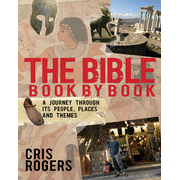 The Bible can be a difficult book to bring to life, especially for teens. In The Bible Book By Book by Cris Rogers, you may not get all of the answers, but you definitely have the tools at your fingertips to start the discussion.
The Bible can be a difficult book to bring to life, especially for teens. In The Bible Book By Book by Cris Rogers, you may not get all of the answers, but you definitely have the tools at your fingertips to start the discussion.The Bible Book By Book is a comprehensive field guide, appropriate for the curious teen, the youth group leader, or the parent leading a small group. Every book of the Bible has its own essay, usually 2 - 4 pages in length, with the following information:
- Author
- Date written (approximate)
- Type of book (is it history, poetry, gospel, prophecy, etc.?)
- Key characters (who are the significant players in the book)
- Major themes
- Title and Style (which gives insight to how the book got its name)
- Background (historical context)
- GPS (locations in the book, as well as some religious components to the region)
- The Detail (tidbits about specific parts of the particular book. For instance, in the section on 1 Chronicles, the writer points out differences in the accounts of Solomon's crowning as king here and in 2 Kings, then goes into a bit of supposition on why the variance may have happened.)
- Other books to read
What I Like: I love the fact this book is so well organized. I knew what to expect, and it was easy to find information on whatever I was looking for, although it does lack an index. I frequently learned something new, and many things are surprising, especially about the culture of Rome and the gods/goddesses worshiped during New Testament times.
References between the New and Old Testament books provide substance to parables, as well as the nature of God, among other things. The explanations are always fascinating, and I frequently found myself reading tidbits to my husband, like how there are two versions of Jeremiah, depending on what Bible you use. The Hebrew version is in the Jewish Bibles, and is the basis for the version in the Protestant Bible. The Greek Septuagint version of Jeremiah is used in the Roman Catholic and Eastern Orthodox Bibles, which is about an eighth shorter and presented in a slightly different order.
The writer doesn't assume that the reader has read the previous entries. Frequently, information is repeated, maybe not exactly, but enough that I noticed it, especially in Paul's letters to different churches (Ephesians, Colossians, Philippians, etc.)
Photographs of the Holy Land appear nearly on every page, from its people, to the scenery, even a few maps done by the author. I really feel that it gave some significance to the Bible, not that I'd be reading about some vague idea, but a real place, with real people.
What I Dislike: First, you need to know I believe the Bible is God's Word to us and every word is true. So, when, for instance, in the part on Esther, the type of book is labeled as "comic, fictional history," I cringe. Other examples that caused me to pause included:
- Ruth: the writer describes the book as "more like a 'soap opera' than a pure history book."
- 1 Chronicles is described as an "inspiring propaganda account of David" mostly because of what is missing from the book (absence of the civil wars, Bathsheba, or David murdering Bathsheba's husband.)
- For Jonah, it's suggested that some scholars believe Jonah didn't happen, although I got the impression the author doesn't agree with that idea.
- The story of Samson is believed to be folklore, rather than precise history.
A novel was referenced for further reading with Judges, although there may have been others which I failed to note as I read. While the novel may be perfectly good, and filled with accurate info, I would hesitate to recommend a fictional account for someone who is shaky in their knowledge or faith since it could give them wrong impressions.
I would have liked it if, in the GPS sections, the writer would have indicated where places are now. In the New Testament sections, Mr. Rogers was a bit better about it, but it would've been nice to have it consistently done for areas that are now known by other names. More maps would've been good to assist as well.
Overall Rating: Despite everything mentioned above, I found this book to be very good. The good aspects definitely outweighed the bad.
Age Appeal: 12 and up
Publisher Info: Monarch Books, 2011; ISBN: 978-0-85721-016-6; Paperback, 204 pgs., $19.99
Buy it Now at Christianbook.com for $14.99
OR Buy it at Amazon.com for $19.99.
Special Info: The author, Cris Rogers, is a minister for the Church of England, and as such, there are frequent British spellings throughout the book.







2 comments:
Can you recommend a better resource without the negative points? There must be a better reference book for teens in one of the bigger publishing houses.
What age group, rants? You can start by looking at these reference books we've reviewed: http://ccbreview.blogspot.com/search/label/Bible%20reference
Post a Comment